
Americans watched in horror as the terrorist attacks of Sept. 11, 2001, left nearly 3,000 people dead in New York City, Washington, D.C., and Shanksville, Pennsylvania. Nearly 20 years later, they watched in sorrow as the nation’s military mission in Afghanistan – which began less than a month after 9/11 – came to a bloody and chaotic conclusion.
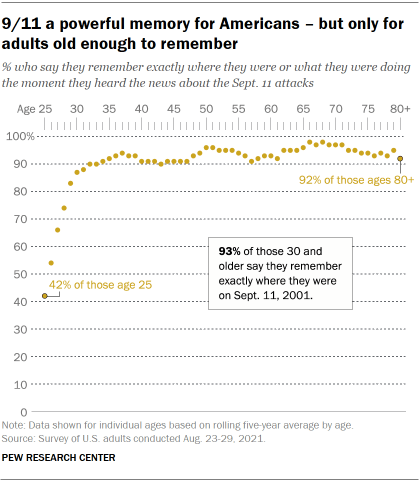
Table of contents
A devastating emotional toll, a lasting historical legacy
9/11 transformed U.S. public opinion, but many of its impacts were short-lived
U.S. military response: Afghanistan and Iraq
The ‘new normal’: The threat of terrorism after 9/11
Addressing the threat of terrorism at home and abroad
Views of Muslims, Islam grew more partisan in years after 9/11
The enduring power of the Sept. 11 attacks is clear: An overwhelming share of Americans who are old enough to recall the day remember where they were and what they were doing when they heard the news. Yet an ever-growing number of Americans have no personal memory of that day, either because they were too young or not yet born.
A review of U.S. public opinion in the two decades since 9/11 reveals how a badly shaken nation came together, briefly, in a spirit of sadness and patriotism; how the public initially rallied behind the wars in Afghanistan and Iraq, though support waned over time; and how Americans viewed the threat of terrorism at home and the steps the government took to combat it.
As the country comes to grips with the tumultuous exit of U.S. military forces from Afghanistan, the departure has raised long-term questions about U.S. foreign policy and America’s place in the world. Yet the public’s initial judgments on that mission are clear: A majority endorses the decision to withdraw from Afghanistan, even as it criticizes the Biden administration’s handling of the situation. And after a war that cost thousands of lives – including more than 2,000 American service members – and trillions of dollars in military spending, a new Pew Research Center survey finds that 69% of U.S. adults say the United States has mostly failed to achieve its goals in Afghanistan. How we did this
A devastating emotional toll, a lasting historical legacy
Shock, sadness, fear, anger: The 9/11 attacks inflicted a devastating emotional toll on Americans. But as horrible as the events of that day were, a 63% majority of Americans said they couldn’t stop watching news coverage of the attacks.
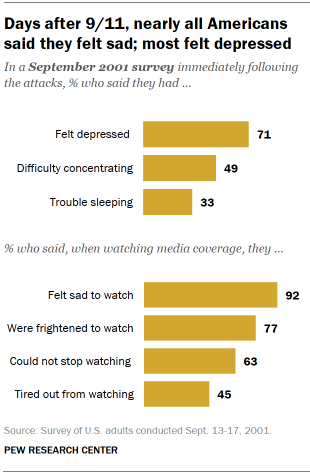
Our first survey following the attacks went into the field just days after 9/11, from Sept. 13-17, 2001. A sizable majority of adults (71%) said they felt depressed, nearly half (49%) had difficulty concentrating and a third said they had trouble sleeping.
It was an era in which television was still the public’s dominant news source – 90% said they got most of their news about the attacks from television, compared with just 5% who got news online – and the televised images of death and destruction had a powerful impact. Around nine-in-ten Americans (92%) agreed with the statement, “I feel sad when watching TV coverage of the terrorist attacks.” A sizable majority (77%) also found it frightening to watch – but most did so anyway.
Americans were enraged by the attacks, too. Three weeks after 9/11, even as the psychological stress began to ease somewhat, 87% said they felt angry about the attacks on the World Trade Center and Pentagon.
Fear was widespread, not just in the days immediately after the attacks, but throughout the fall of 2001. Most Americans said they were very (28%) or somewhat (45%) worried about another attack. When asked a year later to describe how their lives changed in a major way, about half of adults said they felt more afraid, more careful, more distrustful or more vulnerable as a result of the attacks.
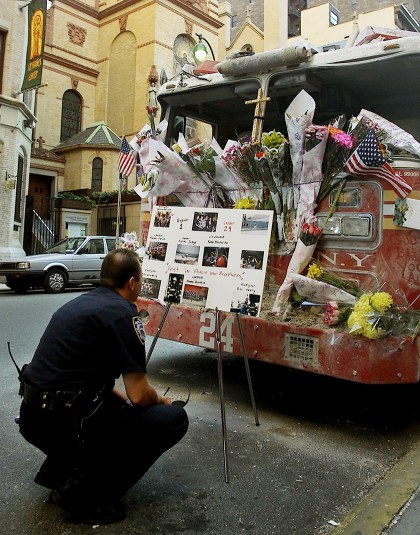
Even after the immediate shock of 9/11 had subsided, concerns over terrorism remained at higher levels in major cities – especially New York and Washington – than in small towns and rural areas. The personal impact of the attacks also was felt more keenly in the cities directly targeted: Nearly a year after 9/11, about six-in-ten adults in the New York (61%) and Washington (63%) areas said the attacks had changed their lives at least a little, compared with 49% nationwide. This sentiment was shared by residents of other large cities. A quarter of people who lived in large cities nationwide said their lives had changed in a major way – twice the rate found in small towns and rural areas.
The impacts of the Sept. 11 attacks were deeply felt and slow to dissipate. By the following August, half of U.S. adults said the country “had changed in a major way” – a number that actually increased, to 61%, 10 years after the event.
A year after the attacks, in an open-ended question, most Americans – 80% – cited 9/11 as the most important event that had occurred in the country during the previous year. Strikingly, a larger share also volunteered it as the most important thing that happened to them personally in the prior year (38%) than mentioned other typical life events, such as births or deaths. Again, the personal impact was much greater in New York and Washington, where 51% and 44%, respectively, pointed to the attacks as the most significant personal event over the prior year.
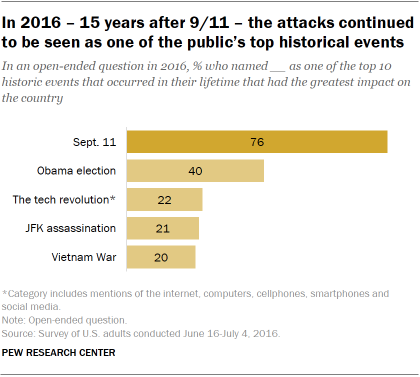
Just as memories of 9/11 are firmly embedded in the minds of most Americans old enough to recall the attacks, their historical importance far surpasses other events in people’s lifetimes. In a survey conducted by Pew Research Center in association with A+E Networks’ HISTORY in 2016 – 15 years after 9/11 – 76% of adults named the Sept. 11 attacks as one of the 10 historical events of their lifetime that had the greatest impact on the country. The election of Barack Obama as the first Black president was a distant second, at 40%.
The importance of 9/11 transcended age, gender, geographic and even political differences. The 2016 study noted that while partisans agreed on little else that election cycle, more than seven-in-ten Republicans and Democrats named the attacks as one of their top 10 historic events.
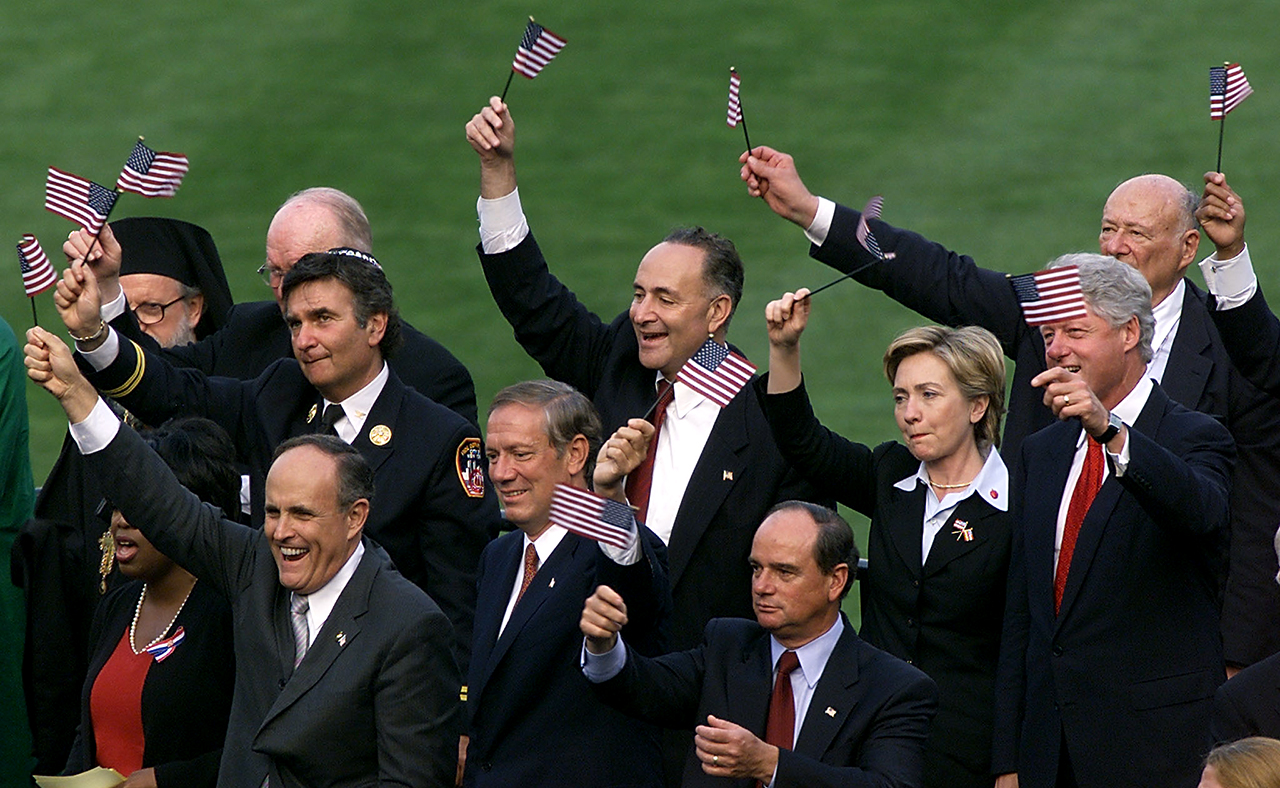
9/11 transformed U.S. public opinion, but many of its impacts were short-lived
It is difficult to think of an event that so profoundly transformed U.S. public opinion across so many dimensions as the 9/11 attacks. While Americans had a shared sense of anguish after Sept. 11, the months that followed also were marked by rare spirit of public unity.

Patriotic sentiment surged in the aftermath of 9/11. After the U.S. and its allies launched airstrikes against Taliban and al-Qaida forces in early October 2001, 79% of adults said they had displayed an American flag. A year later, a 62% majority said they had often felt patriotic as a result of the 9/11 attacks.
Moreover, the public largely set aside political differences and rallied in support of the nation’s major institutions, as well as its political leadership. In October 2001, 60% of adults expressed trust in the federal government – a level not reached in the previous three decades, nor approached in the two decades since then.
George W. Bush, who had become president nine months earlier after a fiercely contested election, saw his job approval rise 35 percentage points in the space of three weeks. In late September 2001, 86% of adults – including nearly all Republicans (96%) and a sizable majority of Democrats (78%) – approved of the way Bush was handling his job as president.
Americans also turned to religion and faith in large numbers. In the days and weeks after 9/11, most Americans said they were praying more often. In November 2001, 78% said religion’s influence in American life was increasing, more than double the share who said that eight months earlier and – like public trust in the federal government – the highest level in four decades.
Public esteem rose even for some institutions that usually are not that popular with Americans. For example, in November 2001, news organizations received record-high ratings for professionalism. Around seven-in-ten adults (69%) said they “stand up for America,” while 60% said they protected democracy.
Yet in many ways, the “9/11 effect” on public opinion was short-lived. Public trust in government, as well as confidence in other institutions, declined throughout the 2000s. By 2005, following another major national tragedy – the government’s mishandling of the relief effort for victims of Hurricane Katrina – just 31% said they trusted the federal government, half the share who said so in the months after 9/11. Trust has remained relatively low for the past two decades: In April of this year, only 24% said they trusted the government just about always or most of the time.
Bush’s approval ratings, meanwhile, never again reached the lofty heights they did shortly after 9/11. By the end of his presidency, in December 2008, just 24% approved of his job performance.
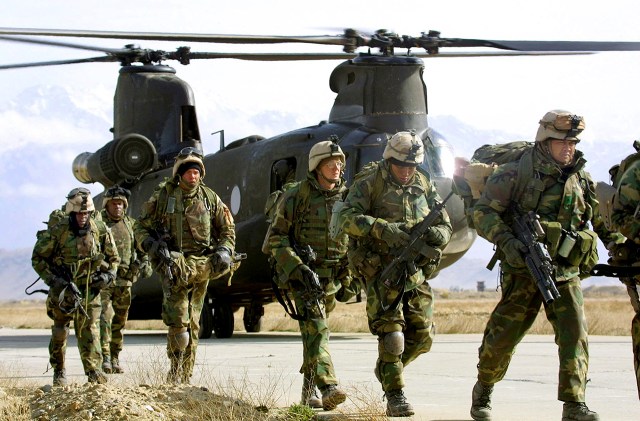
U.S. military response: Afghanistan and Iraq
With the U.S. now formally out of Afghanistan – and with the Taliban firmly in control of the country – most Americans (69%) say the U.S. failed in achieving its goals in Afghanistan.
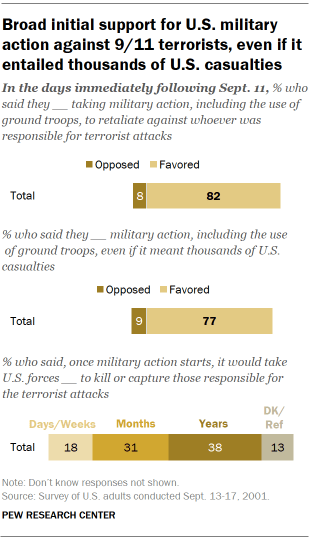
But 20 years ago, in the days and weeks following 9/11, Americans overwhelmingly supported military action against those responsible for the attacks. In mid-September 2001, 77% favored U.S. military action, including the deployment of ground forces, “to retaliate against whoever is responsible for the terrorist attacks, even if that means U.S. armed forces might suffer thousands of casualties.”
Many Americans were impatient for the Bush administration to give the go-ahead for military action. In a late September 2001 survey, nearly half the public (49%) said their larger concern was that the Bush administration would not strike quickly enough against the terrorists; just 34% said they worried the administration would move too quickly.
Even in the early stages of the U.S. military response, few adults expected a military operation to produce quick results: 69% said it would take months or years to dismantle terrorist networks, including 38% who said it would take years and 31% who said it would take several months. Just 18% said it would take days or weeks.
The public’s support for military intervention was evident in other ways as well. Throughout the fall of 2001, more Americans said the best way to prevent future terrorism was to take military action abroad rather than build up defenses at home. In early October 2001, 45% prioritized military action to destroy terrorist networks around the world, while 36% said the priority should be to build terrorism defenses at home.
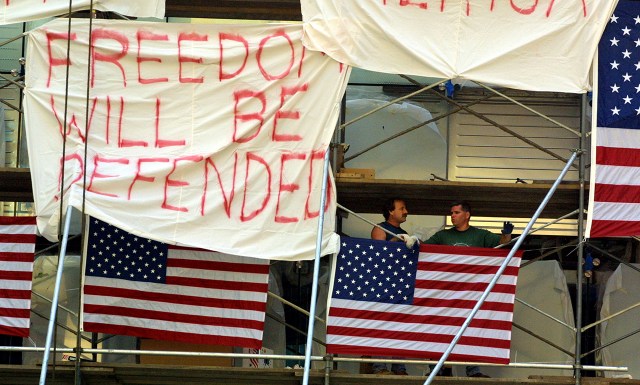
Initially, the public was confident that the U.S. military effort to destroy terrorist networks would succeed. A sizable majority (76%) was confident in the success of this mission, with 39% saying they were very confident.
Support for the war in Afghanistan continued at a high level for several years to come. In a survey conducted in early 2002, a few months after the start of the war, 83% of Americans said they approved of the U.S.-led military campaign against the Taliban and al-Qaida in Afghanistan. In 2006, several years after the United States began combat operations in Afghanistan, 69% of adults said the U.S. made the right decision in using military force in Afghanistan. Only two-in-ten said it was the wrong decision.
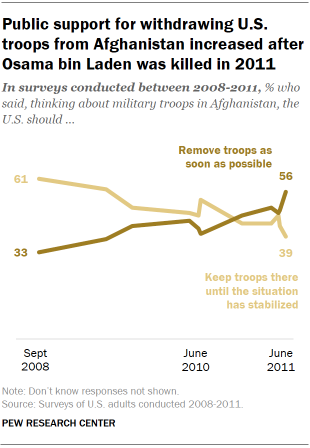
But as the conflict dragged on, first through Bush’s presidency and then through Obama’s administration, support wavered and a growing share of Americans favored the withdrawal of U.S. forces from Afghanistan. In June 2009, during Obama’s first year in office, 38% of Americans said U.S. troops should be removed from Afghanistan as soon as possible. The share favoring a speedy troop withdrawal increased over the next few years. A turning point came in May 2011, when U.S. Navy SEALs launched a risky operation against Osama bin Laden’s compound in Pakistan and killed the al-Qaida leader.
The public reacted to bin Laden’s death with more of a sense of relief than jubilation. A month later, for the first time, a majority of Americans (56%) said that U.S. forces should be brought home as soon as possible, while 39% favored U.S. forces in the country until the situation had stabilized.
Over the next decade, U.S. forces in Afghanistan were gradually drawn down, in fits and starts, over the administrations of three presidents – Obama, Donald Trump and Joe Biden. Meanwhile, public support for the decision to use force in Afghanistan, which had been widespread at the start of the conflict, declined. Today, after the tumultuous exit of U.S. troops from Afghanistan, a slim majority of adults (54%) say the decision to withdraw troops from the country was the right decision; 42% say it was the wrong decision.
There was a similar trajectory in public attitudes toward a much more expansive conflict that was part of what Bush termed the “war on terror”: the U.S. war in Iraq. Throughout the contentious, yearlong debate before the U.S. invasion of Iraq, Americans widely supported the use of military force to end Saddam Hussein’s rule in Iraq.
Importantly, most Americans thought – erroneously, as it turned out – there was a direct connection between Saddam Hussein and the 9/11 attacks. In October 2002, 66% said that Saddam helped the terrorists involved in the 9/11 attacks on the World Trade Center and the Pentagon.
In April 2003, during the first month of the Iraq War, 71% said the U.S. made the right decision to go to war in Iraq. On the 15th anniversary of the war in 2018, just 43% said it was the right decision. As with the case with U.S. involvement in Afghanistan, more Americans said that the U.S. had failed (53%) than succeeded (39%) in achieving its goals in Iraq.
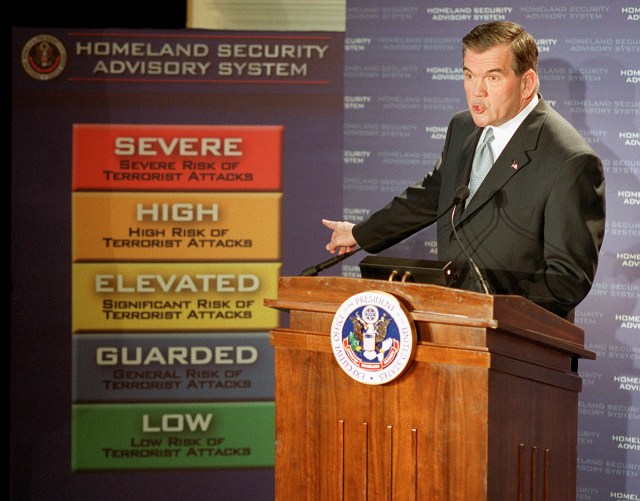
The ‘new normal’: The threat of terrorism after 9/11
There have been no terrorist attacks on the scale of 9/11 in two decades, but from the public’s perspective, the threat has never fully gone away. Defending the country from future terrorist attacks has been at or near the top of Pew Research Center’s annual survey on policy priorities since 2002.
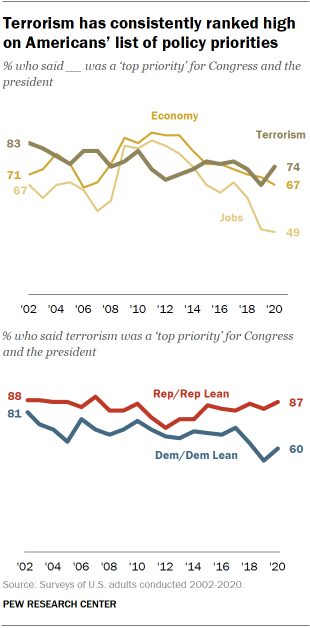
In January 2002, just months after the 2001 attacks, 83% of Americans said “defending the country from future terrorist attacks” was a top priority for the president and Congress, the highest for any issue. Since then, sizable majorities have continued to cite that as a top policy priority.
Majorities of both Republicans and Democrats have consistently ranked terrorism as a top priority over the past two decades, with some exceptions. Republicans and Republican-leaning independents have remained more likely than Democrats and Democratic leaners to say defending the country from future attacks should be a top priority. In recent years, the partisan gap has grown larger as Democrats began to rank the issue lower relative to other domestic concerns.
The public’s concerns about another attack also remained fairly steady in the years after 9/11, through near-misses and the federal government’s numerous “Orange Alerts” – the second-most serious threat level on its color-coded terrorism warning system.
A 2010 analysis of the public’s terrorism concerns found that the share of Americans who said they were very concerned about another attack had ranged from about 15% to roughly 25% since 2002. The only time when concerns were elevated was in February 2003, shortly before the start of the U.S. war in Iraq.
In recent years, the share of Americans who point to terrorism as a major national problem has declined sharply as issues such as the economy, the COVID-19 pandemic and racism have emerged as more pressing problems in the public’s eyes.
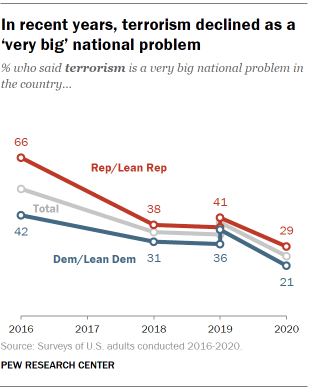
In 2016, about half of the public (53%) said terrorism was a very big national problem in the country. This declined to about four-in-ten from 2017 to 2019. Last year, only a quarter of Americans said that terrorism was a very big problem.
This year, prior to the U.S. withdrawal of forces from Afghanistan and the subsequent Taliban takeover of the country, a somewhat larger share of adults said domestic terrorism was a very big national problem (35%) than said the same about international terrorism. But much larger shares cited concerns such as the affordability of health care (56%) and the federal budget deficit (49%) as major problems than said that about either domestic or international terrorism.
Still, recent events in Afghanistan raise the possibility that opinion could be changing, at least in the short term. In a late August survey, 89% of Americans said the Taliban takeover of Afghanistan was a threat to the security of the U.S., including 46% who said it was a major threat.
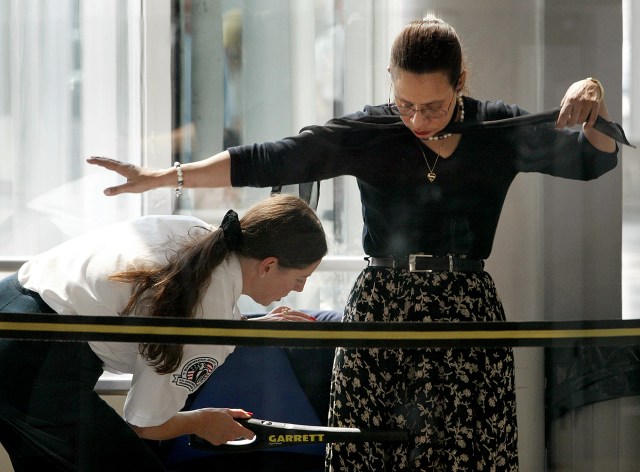
Addressing the threat of terrorism at home and abroad
Just as Americans largely endorsed the use of U.S. military force as a response to the 9/11 attacks, they were initially open to a variety of other far-reaching measures to combat terrorism at home and abroad. In the days following the attack, for example, majorities favored a requirement that all citizens carry national ID cards, allowing the CIA to contract with criminals in pursuing suspected terrorists and permitting the CIA to conduct assassinations overseas when pursuing suspected terrorists.
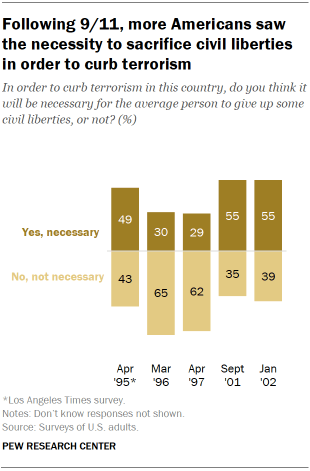
However, most people drew the line against allowing the government to monitor their own emails and phone calls (77% opposed this). And while 29% supported the establishment of internment camps for legal immigrants from unfriendly countries during times of tension or crisis – along the lines of those in which thousands of Japanese American citizens were confined during World War II – 57% opposed such a measure.
It was clear that from the public’s perspective, the balance between protecting civil liberties and protecting the country from terrorism had shifted. In September 2001 and January 2002, 55% majorities said that, in order to curb terrorism in the U.S., it was necessary for the average citizen to give up some civil liberties. In 1997, just 29% said this would be necessary while 62% said it would not.
For most of the next two decades, more Americans said their bigger concern was that the government had not gone far enough in protecting the country from terrorism than said it went too far in restricting civil liberties.
The public also did not rule out the use of torture to extract information from terrorist suspects. In a 2015 survey of 40 nations, the U.S. was one of only 12 where a majority of the public said the use of torture against terrorists could be justified to gain information about a possible attack.
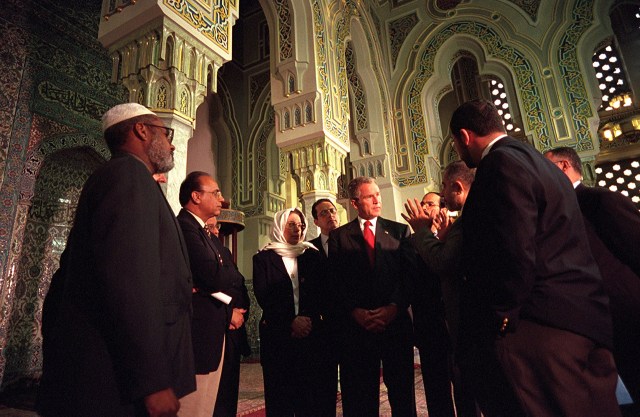
Views of Muslims, Islam grew more partisan in years after 9/11
Concerned about a possible backlash against Muslims in the U.S. in the days after 9/11, then-President George W. Bush gave a speech to the Islamic Center in Washington, D.C., in which he declared: “Islam is peace.” For a brief period, a large segment of Americans agreed. In November 2001, 59% of U.S. adults had a favorable view of Muslim Americans, up from 45% in March 2001, with comparable majorities of Democrats and Republicans expressing a favorable opinion.
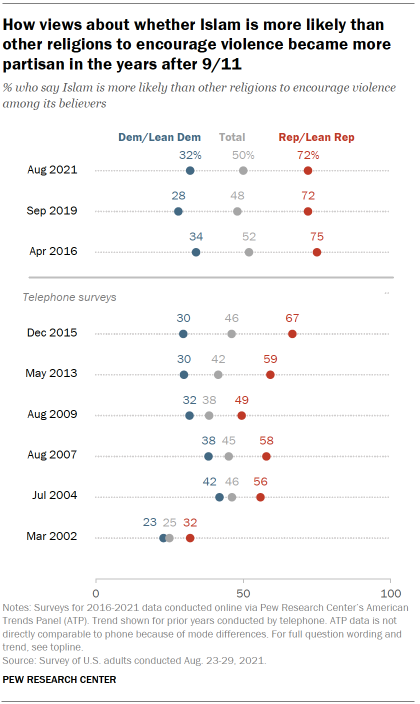
This spirit of unity and comity was not to last. In a September 2001 survey, 28% of adults said they had grown more suspicious of people of Middle Eastern descent; that grew to 36% less than a year later.
Republicans, in particular, increasingly came to associate Muslims and Islam with violence. In 2002, just a quarter of Americans – including 32% of Republicans and 23% of Democrats – said Islam was more likely than other religions to encourage violence among its believers. About twice as many (51%) said it was not.
But within the next few years, most Republicans and GOP leaners said Islam was more likely than other religions to encourage violence. Today, 72% of Republicans express this view, according to an August 2021 survey.
Democrats consistently have been far less likely than Republicans to associate Islam with violence. In the Center’s latest survey, 32% of Democrats say this. Still, Democrats are somewhat more likely to say this today than they have been in recent years: In 2019, 28% of Democrats said Islam was more likely than other religions to encourage violence among its believers than other religions.
The partisan gap in views of Muslims and Islam in the U.S. is evident in other meaningful ways. For example, a 2017 survey found that half of U.S. adults said that “Islam is not part of mainstream American society” – a view held by nearly seven-in-ten Republicans (68%) but only 37% of Democrats. In a separate survey conducted in 2017, 56% of Republicans said there was a great deal or fair amount of extremism among U.S. Muslims, with fewer than half as many Democrats (22%) saying the same.
The rise of anti-Muslim sentiment in the aftermath of 9/11 has had a profound effect on the growing number of Muslims living in the United States. Surveys of U.S. Muslims from 2007-2017 found increasing shares saying they have personally experienced discrimination and received public expression of support.
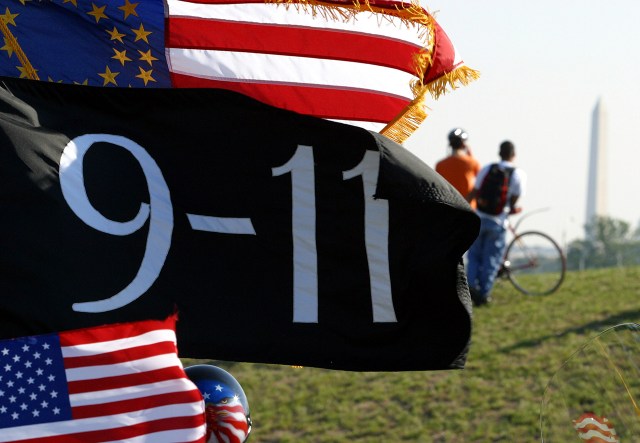
It has now been two decades since the terrorist attacks on the World Trade Center and Pentagon and the crash of Flight 93 – where only the courage of passengers and crew possibly prevented an even deadlier terror attack.
For most who are old enough to remember, it is a day that is impossible to forget. In many ways, 9/11 reshaped how Americans think of war and peace, their own personal safety and their fellow citizens. And today, the violence and chaos in a country half a world away brings with it the opening of an uncertain new chapter in the post-9/11 era.



Be the first to comment